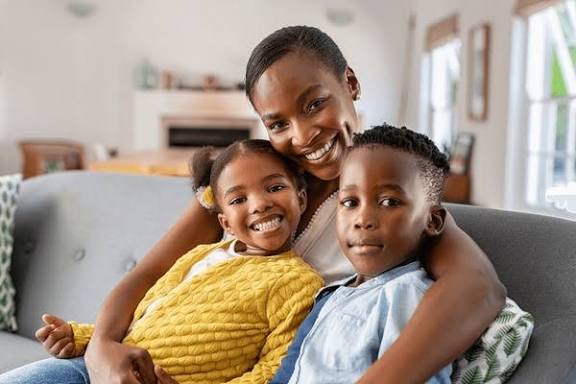Fear vs Freedom: Raising Africa’s Next Generation

Fear has Become the New Family Language
Every day, African parents wake up to a silent competition, who has the most disciplined child, the best grades, the most polite voice, Homes have become emotional battlegrounds filled with expectations, silent comparisons, and unspoken guilt.
Parenting, once about nurture and connection, now feels like an endless performance of control for many, it’s not intentional, Parents want the best for their children, but in the process, fear has become the main parenting tool, fear of failure, fear of embarrassment, fear of raising a child “not good enough.”
Family conversations often revolve around correction, not curiosity ‘’What did you learn’’ replaces “Why did you get a B?” The laughter that once filled homes is now replaced with silence that feels like judgment, Yet beneath the love and discipline lies a haunting question:
If we raise children to fear us instead of trust us, who will they become when we’re gone?

Source: Google
The Psychology of Fear-Based Parenting
The average African parent isn’t cruel they’re simply Scared of repeating past mistakes, Scared of poverty, Scared that love without control will breed chaos, According to UNICEF SOUTH AFRICA consistent emotional support is one of the strongest predictors of a child’s resilience, Yet in many homes, “good parenting” means compliance, not connection.
Decades of social pressure have created a cycle where obedience is valued more than understanding, and silence is mistaken for respect, Psychologically, fear-based parenting breeds insecurity, Studies from the World Health Organization show that children raised under chronic fear and pressure develop higher anxiety levels and lower emotional intelligence traits that shape how they learn, relate, and lead.
When a child grows up hearing “Don’t talk back” instead of “Let’s talk,” they internalize that their voice doesn’t matter. Over time, this creates adults who either suppress emotions or rebel against authority, Neither outcome nurtures emotional health.
So the question remains are we raising children who respect us, or children who simply fear us?
The Cost Of Raising Children In Fear
Fear may produce short-term obedience, but it destroys long-term confidence, Many African children grow up unable to express opinions, challenge authority, or make independent decisions, They learn to survive, not to thrive, Adults who excel professionally but struggle emotionally, People who follow rules but can’t take initiative, A society full of high achievers who are silently afraid of failure.
We celebrate their success stories but ignore their silent battles the anxiety, the burnout, the deep need for validation that never fades, When love is conditional and approval feels earned, the home becomes a training ground for anxiety.
Research from Care For Child Development shows that children who experience “responsive caregiving” being listened to, validated, and encouraged develop higher self-esteem and creativity later in life, A child who learns that affection is a reward, not a given, grows into an adult who constantly performs for acceptance and when they eventually become parents, they often repeat the cycle out of love, but also out of fear.
Source : Google
Why Modern Parents Feel Trapped
It would be dishonest to shame African parents, They are parenting in one of the hardest economic and cultural climates in the world juggling bills, work, insecurity, and societal judgment, Social media adds even more pressure, glorifying “perfect” families and making real ones feel inadequate.
Every smiling photo hides exhaustion; every “parenting hack” reminds someone of their shortcomings, Many parents fear that relaxing control means losing authority but in truth, connection builds respect faster than fear ever can. Children don’t need perfect parents they need present ones.
According to UNICEF’s Positive Parenting Campaign positive discipline strengthens family bonds and reduces behavioral problems more effectively than punishment alone, Today’s parents are more self-aware than ever before. Many know the pain of strict, emotionless upbringings and genuinely want to do better but without models for emotional openness, they struggle to balance discipline with empathy.
The pressure to be both traditional and modern creates confusion:
“If I’m too soft, will my child lose respect for me? If I’m too hard, will they fear me forever?”
Parenting today has become a tug-of-war between past expectations and modern understanding.
The Need for Balance
Parenting should not be an emotional war. Children need both structure and softness boundaries wrapped in empathy, This balance is what builds confidence, Discipline without connection breeds rebellion; connection without boundaries breeds confusion.
Experts at the National center for Biotechnology Information emphasize that emotional regulation by parents directly improves children’s academic and social outcomes, Parenting experts now recommend: Replace punishment with communication, Allow children to fail safely and teach them resilience, not perfection, Reward honesty, even when it’s uncomfortable, Model the emotional regulation you want to see.
Create space for open dialogue not just when there’s a problem, but as a daily habit, Celebrate effort as much as achievement because one day, these children will lead and how they lead depends on how they were loved, Children who are trusted grow into adults who trust themselves and a generation raised in empathy will lead with empathy.
Rebuilding Connection
Across Africa, a quiet revolution in parenting is taking place, More young parents are turning to gentle parenting, positive discipline, and emotional literacy, They are breaking generational patterns teaching that love and discipline can coexist.
Parenting classes, podcasts, and online communities are springing up from Nairobi to Lagos to Cape Town, where parents share lessons, frustrations, and breakthroughs, In Kenya, mothers form “support circles” to talk openly about childhood trauma.
In Nigeria, psychologists host webinars teaching parents how to manage anger before discipline, In South Africa, schools introduce social-emotional learning programs to help children express feelings in healthy ways.
It’s proof that Africa is ready to raise emotionally intelligent leaders not just obedient citizens, The narrative is shifting from control to connection, from silence to dialogue.

Source : Google
A Continent Still Worth Parenting For
Parenting is one of Africa’s most powerful tools for nation-building, The children we raise today will decide the values, systems, and innovations of tomorrow, If we raise them in fear, we build a continent of silence, If we raise them in freedom, we build a generation of thinkers.
The question isn’t “Are we raising good children?’’ It’s “Are we raising strong, secure humans who will make Africa better?” nations don’t fall when leaders fail, they fall when parents stop believing in thier power to shape the future.
The home is the first School and love is the first lesson , let that lesson be one of courage, compassion and connection, The next generation is watching not just what we say but how we love. Maybe the real revolution won’t begin in parliament or protest but around dinner tables where parents finally chose Freedom Over Fear.
You may also like...
Ndidi's Besiktas Revelation: Why He Chose Turkey Over Man Utd Dreams

Super Eagles midfielder Wilfred Ndidi explained his decision to join Besiktas, citing the club's appealing project, stro...
Tom Hardy Returns! Venom Roars Back to the Big Screen in New Movie!

Two years after its last cinematic outing, Venom is set to return in an animated feature film from Sony Pictures Animati...
Marvel Shakes Up Spider-Verse with Nicolas Cage's Groundbreaking New Series!

Nicolas Cage is set to star as Ben Reilly in the upcoming live-action 'Spider-Noir' series on Prime Video, moving beyond...
Bad Bunny's 'DtMF' Dominates Hot 100 with Chart-Topping Power!

A recent 'Ask Billboard' mailbag delves into Hot 100 chart specifics, featuring Bad Bunny's "DtMF" and Ella Langley's "C...
Shakira Stuns Mexico City with Massive Free Concert Announcement!

Shakira is set to conclude her historic Mexican tour trek with a free concert at Mexico City's iconic Zócalo on March 1,...
Glen Powell Reveals His Unexpected Favorite Christopher Nolan Film

A24's dark comedy "How to Make a Killing" is hitting theaters, starring Glen Powell, Topher Grace, and Jessica Henwick. ...
Wizkid & Pharrell Set New Male Style Standard in Leather and Satin Showdown

Wizkid and Pharrell Williams have sparked widespread speculation with a new, cryptic Instagram post. While the possibili...
Victor Osimhen Unveils 'A Prayer From the Gutter', Inspiring Millions with His Journey

Nigerian football star Victor Osimhen shares his deeply personal journey from the poverty-stricken Olusosun landfill in ...





